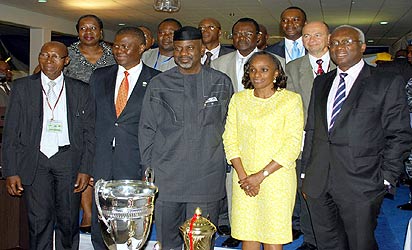Information and Communications Technology Development in Nigeria and the Future Growth

PUBLISHED BELOW IS THE SPEECH BY THE HONOURABLE MINISTER OF COMMUNICATION TECHNOLOGY, MRS. OMOBOLA JOHNSON AT THE ISPON 2012 NATIONAL SOFTWARE CONFERENCE AND COMPETITION FROM OCTOBER HELD RECENTLY WITH THE THEME: THE CLOUD AND THE FUTURE OF SOFTWARE NIGERIA
It is my pleasure to make these short remarks at this year’s National Software Conference and Software Competition organized by ISPON in collaboration with its partners including NITDA an agency of the Federal Ministry of Communication Technology.
This event has now become a regular feature in the calendar of ICT events and it is a testament to the growing importance of our local software development industry. This event and the software competition help to not only discover and promote local talent in the software industry but it also increases the awareness of the need to nurture and develop that same talent to support and fuel the growth of the industry.

Our software industry has grown over the years to produce local and regional brands like Human Manager, Xceed, Progenics and Symbol to mention a few.
In addition, our software developers are continuing to do us proud both locally and internationally. I had the pleasure of hosting the winners and runners up of last year’s competition and I must say I was not only inspired by the sheer talent of these young men and women but also impressed by the useful and relevant applications that they had developed. I have visited the Co-creation hub, a software innovation centre in Lagos and met with a number of other software innovation hub managers and the commitment to software development and industry is exemplary.
Internationally, Nigerian software developers are also making great strides. Last year at the annual International Telecommunication Union Event in Geneva, Somto Sharon Fab-Ukozor won the prestigious ITU Young Innovators contest with her Mobile Skills to Cash application that was selected as the most innovative solution from other young innovators across the globe. I have just returned from the biennial World Congress on IT in Canada and two young Nigerian software developers – Olusegun Fodeke of iWatch and Oluseun David Onigbinde, Joseph Agunbiade and Mayowa Jaiyeola for BudgIT – were category winners while the lead developer of the South African category winner is a Nigerian.
The challenge before us is therefore to ensure that these discovered talents and individuals are nurtured and encouraged to build successful software brands and companies.
Last month in the conclusion of a bid to develop the country’s national portal we selected a promising Nigerian company to build a state-of-the-art portal that will provide single view access to government information and online services to citizens and other stakeholders.
Another portal that will support the soon to be launched PC Ownership scheme was developed by a group of young Nigerian developers that won a competition supported by Intel and the Ministry of CommTech in a field of very strong submissions.
Federal government, state governments and private businesses need to do more of this to foster the growth and development of this industry. We need to move these young developers from ideas and competition winning to social and economic success which will contribute in no small measure to the development of a world class home grown software industry.
This is why we have partnered with the private sector to develop a framework that will increase the number of IT innovation hubs in the country. Two pilot hubs based on this new framework will be established this year. These centres will provide an enabling environment and structured program where the ideas and innovation of the Nigerian ICT Entrepreneurs and software developers can be incubated to successful IT businesses in Nigeria and across the region. At these centres, incubates will be provided with facilities, free software development tools, mentoring, business and technical training and business advisory services. At this point I really must commend the Cross Rivers State Government for the vision of Tinapa Knowledge City to be created from this premises where we are being hosted and the offering of space and partnership with NITDA to site one of the two pilot centres here.
The Ministry through the NITDEVF will also be seeding a venture capital fund specifically to support ICT entrepreneurs later on this year. We expect that these actions which are complementary to all the efforts that have been and are being made today will play an important role in catalysing this industry and taking it to where it really should be – the $6bn industry that it has been estimated to be.
Let me now turn to the theme of the conference – The Cloud and the future of software in Nigeria – which I think is an important topic that will also catalyse the development of the industry in Nigeria.
This theme is apt as all over the world, cloud computing is becoming a widely accepted and widely pursued economic model for the deployment and use of ICT in both public and private sectors.
There are many experts on cloud computing here and I am sure that they will not only do justice to this topic but will give us sufficient food for thought as we embark on our cloud computing journey in Nigeria – both in the public and private sector. But suffice it to say that we have wholly embraced the concept of cloud computing in government. Government spend on ICTs is increasing every year – last year we calculated that based on budgeted amounts FGN would spend about N19.4bn on data centres alone to host applications and data. Given our plans for e-Government and the increased use of ICT by government MDAs this is an unsustainable practice that must be managed. A Government cloud will provide some economic savings.
Galaxy Backbone has therefore embarked on extending and expanding its infrastructure to provide a shared platform for the delivery of ICT infrastructure services to MDAs through the deployment of a Government Cloud. The Government Cloud will provide unified computing solutions that enable access through secure networks (or the internet) to a pool of shared resources.
This will help Government MDAs address the technology challenges enumerated above and derive the following benefits:
Cost Effectiveness: The Government cloud computing service model aims at reducing the barrier to acquisition of high technology and skilled staff by MDAs of Government and provides a ready plug-and-play platform for various MDAs. Smaller or poorly funded MDAs can thus roll out technology based online services without expending huge sums on infrastructure
Rapid Elasticity: Cloud computing is designed to provide services with robust scalability as cloud computing resources can be scaled up or down automatically and can be purchased in any quantity in any time. Literally, on a pay-as-you-go basis. Cloud computing thus has the flexibility to support different MDAs at different stages of IT adoption by providing access to basic ICT infrastructure or higher end requirements like Platform or Software as a service or even business process as a service – where they completely free themselves of the investment and maintenance of all technology components and focus on their core statutory functions.
Ease of maintenance and support: the Cloud service package will enable Government to retain fewer and dedicated high caliber technical personnel and make their service available across the entire platform to all MDAs.
Back up and Disaster Recovery: As more and more critical Government services go online and people begin to depend on them, their availability becomes critical and back up, business continuity and disaster recovery become critical success factors. Hence, Government Cloud will provide MDAs with more options to restore data rapidly and effectively at very reduced cost.
This approach to the underlying technology provides the greatest opportunity for Nigeria to deploy the latest ICT infrastructure capabilities for efficiency and improved service delivery in a cost effective manner.
The Federal Government is already deploying cloud computing to manage some of its core operations. Example of such is the Integrated Payroll and Personnel Information System (IPPIS) which is being rolled out in phases to all the MDAs in Software as a Service type of cloud computing. With this, the Office of the Accountant General of the Federation is able to administer civil servants’ identification and payroll in a more effective and efficient manner.
Today, the Federal Ministry of Finance can attest to the success of the IPPIS which has so far been implemented at 183 MDAs, and have yielded a cost saving of over N14billion from the previous manual processes.
These are just a few examples of the possibilities of cloud computing and the potential that it presents to both the private and the public sector.
To ISPON and its partners, I want to say well done for organizing this event and the competition to expose software development talent in some of our youths, and for giving them the platform to explore new horizons.
To the Cross Rivers State government under the exemplary leadership of His Excellency Governor Liyel Imoke I commend you for your vision and look forward to a long and fruitful partnership as we work with you to make the Tinapa Knowlede City a reality.
To the young aspiring developers I say give this opportunity all you’ve got, even if you don’t win this will have been an opportunity to hone your skills, develop new skills and understand what it takes to develop a winning application – the very best of luck.


